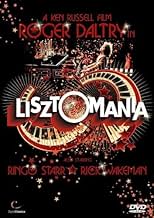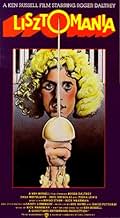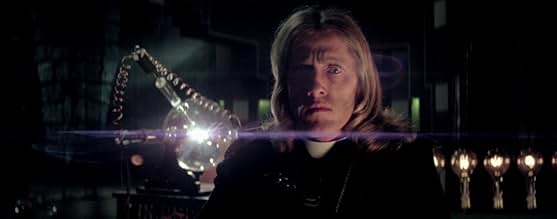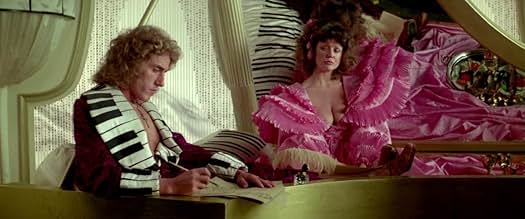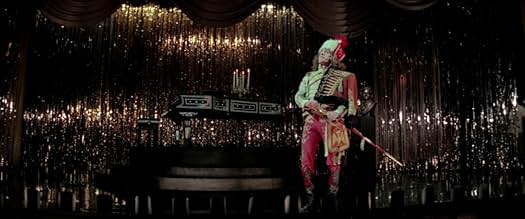PUNTUACIÓN EN IMDb
6,1/10
3,2 mil
TU PUNTUACIÓN
Añade un argumento en tu idiomaComposer and pianist Franz Liszt (Roger Daltrey) attempts to overcome his hedonistic life-style while repeatedly being drawn back into it by the many women in his life and fellow composer Ri... Leer todoComposer and pianist Franz Liszt (Roger Daltrey) attempts to overcome his hedonistic life-style while repeatedly being drawn back into it by the many women in his life and fellow composer Richard Wagner (Paul Nicholas).Composer and pianist Franz Liszt (Roger Daltrey) attempts to overcome his hedonistic life-style while repeatedly being drawn back into it by the many women in his life and fellow composer Richard Wagner (Paul Nicholas).
Argumento
¿Sabías que...?
- CuriosidadesFirst movie to be encoded with a Dolby Stereo optical soundtrack.
- PifiasDuring the flashback when Liszt is notating the music for Dream of Love; on the second page in the first measure there is the note E-Flat written as an E with the flat symbol next to it. However, since the song is already in the key of A-Flat which includes E-Flat in the scale, it is not necessary to notate the Flat symbol next to the E note. This is only done if the previous E-note was notated as an E-Natural and even then the flat symbol would be placed in parenthesis.
- ConexionesFeatured in Hollywood Singing & Dancing: A Musical History - 1970's (2009)
- Banda sonoraRienzi/ Chopsticks Fantasia
Composed by Richard Wagner and Franz Liszt
Reseña destacada
To many, this film is the stunning-proof that director Ken Russell never had it, and that idiocy and egotism were mistaken for genius. You could say mistaking idiocy and egotism for genius has been the appeal of rock music! Others might say that Russell is simply childish or immature, and that his films are the "masturbatory-fantasies" of an overgrown-adolescent. This belief is unfounded. Is this film over-indulgent? Yes it is, dear readers, very-much-so, because it is art, not entertainment. That-said, if you chuck any expectations, this is a funny film and allegory about the rise of pop-culture in the 19th Century. It draws parallels between Liszt's fame with the other generally-hollow spectacle known as "rock." This is great film-making, and it should be noted that it has similarities between itself and "Rocky Horror," and even "Hedwig and the Angry Inch," as they all examine and explore the relationships between sexuality and pop-culture in similar-areas. It really is true that women threw their underwear at Franz Liszt during his performances, and that he had many-many lovers--groupies.
Lisztomania is an odd bridge-between "classic" rock and the emergent punk-movement of the time. The film can also be seen as a statement that "rock" is not really subversive or rebellious at-all, but ultimately arch-conservative, and repressive. Amen. It's just a hilarious, wild-romp that will make your guests extremely nervous, which films should do. Movies should challenge people to think and reflect--at-least occasionally. Ironically (or maybe-not!), Mr. Russell had contracted Malcolm MacLaren and Vivienne Westwood to design the S&M-costumes for his film, "Mahler." It should also-be-noted that "Liszt-o-Mania" was released exactly the same year that MacLaren's shop "SEX" opened on King's Row, the rest is as they say, is history. It couldn't be more camp, it has Little Nell in it.
Basically-put, this is about the the ins-and-outs of "why" we want and need pop-culture, and WHAT we generally-want from our "pop-idols" (sex, of-course). One could easily-say this film criticizes the absurd spectacle that rock had become by 1975, and we get this quite-often in the film. But this theme goes much-deeper, into the relationship-between artist and patron (once, just the aristocracy, now the mob is added). The sexuality is about mass-psychology, too, so Wilhelm Reich gets-his-due, and there is a plethora of Freudian-imagery. It is certainly a very-personal film for Russell, and probably amuses him as much as it does myself that it enrages so-many critics, but it should be noted that some of the absurdity and excess came from the producer of the film, not Mr. Russell. Ken Rusell enrages all the right-people, and that's what some film-making should be.
God love this lapsed-Catholic, and God love his ways. A flawed part of his canon, but very watchable and educational. As Russell began his career doing documentaries and impressionistic-films on composers for the BBC, it makes-sense that this is considered one of his most heretical-works. He complains about the opening country-song in his autobiography 'Altered States', and there were other aspects of the production he didn't want in the film. It's interesting to note that the 1980s was the period of his purest-work, due mainly to a three-picture-deal with Vestron. The 1970s were actually a very mixed-bag for him, as Lisztomania attests. He isn't entirely-pleased with it, but had some fun with the material, and there it is. I think it's a hoot, which means it isn't on DVD.
Lisztomania is an odd bridge-between "classic" rock and the emergent punk-movement of the time. The film can also be seen as a statement that "rock" is not really subversive or rebellious at-all, but ultimately arch-conservative, and repressive. Amen. It's just a hilarious, wild-romp that will make your guests extremely nervous, which films should do. Movies should challenge people to think and reflect--at-least occasionally. Ironically (or maybe-not!), Mr. Russell had contracted Malcolm MacLaren and Vivienne Westwood to design the S&M-costumes for his film, "Mahler." It should also-be-noted that "Liszt-o-Mania" was released exactly the same year that MacLaren's shop "SEX" opened on King's Row, the rest is as they say, is history. It couldn't be more camp, it has Little Nell in it.
Basically-put, this is about the the ins-and-outs of "why" we want and need pop-culture, and WHAT we generally-want from our "pop-idols" (sex, of-course). One could easily-say this film criticizes the absurd spectacle that rock had become by 1975, and we get this quite-often in the film. But this theme goes much-deeper, into the relationship-between artist and patron (once, just the aristocracy, now the mob is added). The sexuality is about mass-psychology, too, so Wilhelm Reich gets-his-due, and there is a plethora of Freudian-imagery. It is certainly a very-personal film for Russell, and probably amuses him as much as it does myself that it enrages so-many critics, but it should be noted that some of the absurdity and excess came from the producer of the film, not Mr. Russell. Ken Rusell enrages all the right-people, and that's what some film-making should be.
God love this lapsed-Catholic, and God love his ways. A flawed part of his canon, but very watchable and educational. As Russell began his career doing documentaries and impressionistic-films on composers for the BBC, it makes-sense that this is considered one of his most heretical-works. He complains about the opening country-song in his autobiography 'Altered States', and there were other aspects of the production he didn't want in the film. It's interesting to note that the 1980s was the period of his purest-work, due mainly to a three-picture-deal with Vestron. The 1970s were actually a very mixed-bag for him, as Lisztomania attests. He isn't entirely-pleased with it, but had some fun with the material, and there it is. I think it's a hoot, which means it isn't on DVD.
- myboigie
- 23 jul 2006
- Enlace permanente
Selecciones populares
Inicia sesión para calificar y añadir a tu lista para recibir recomendaciones personalizadas
- How long is Lisztomania?Con tecnología de Alexa
Detalles
- Duración1 hora 43 minutos
- Mezcla de sonido
- Relación de aspecto
- 2.35 : 1
Contribuir a esta página
Sugerir un cambio o añadir el contenido que falta

Principal laguna de datos
By what name was Lisztomania (1975) officially released in India in English?
Responde

